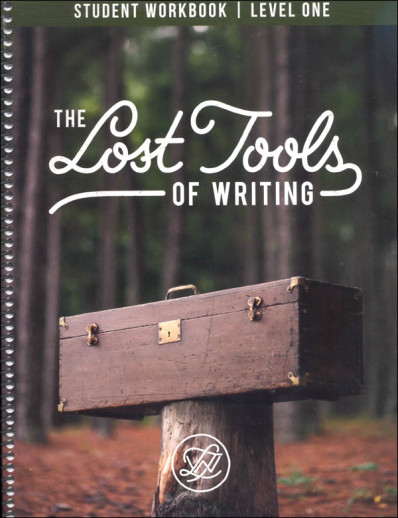We use cookies to make your experience better. To comply with the new e-Privacy directive, we need to ask for your consent to set the cookies. Learn more.
Lost Tools of Writing: Level One Student Workbook
The Student Workbook provides worksheets for the lesson exercises, essay templates, and Appendices (Self-Edit Checklists, Sample Essays, Glossary, and Lesson Summaries). The student uses this to complete the preparatory assignments leading up to the crafting of each Lesson's essay assignment. One Student Workbook (not reproducible) needed per student. Level One begins with the assumption of some writing instruction/experience (9th grade, or a middle schooler with some writing prep could be ready for the course, or even upper-level high schooler would profit from the course if their writing instruction had been minimal). Students construct persuasive essays, with a thorough coverage of all the basic classical tools of writing. The Handbook of Types available for this level provides additional examples taken from classic stories.
The Student Workbook for Level One contains a complete set of worksheets for every Lesson, a glossary, checklists for student's to revise their essays, and a complete set of arrangement templates for outlining essays.
Please note that the complete set of the Lost Tools of Writing includes one Student's Workbook. A separate workbook must be purchased for each additional student using the program. Per copyright rules, it is not permissible to photocopy worksheets for additional students without express written permission.
Teaching students to think and to communicate ideas--it's a large goal and a worthy one. It's also the classical way of approaching the skills of rhetoric to focus on the thinking that leads to good writing. Lost Tools of Writing provides a thorough breakdown of skills, tools and basic principles to learn and use in the step-by-step process of developing the art of communication. After all, (in their words) "writing on paper, parchment, or a screen is only a record of something that has previously happened in the mind."
Students and teachers have typically struggled with some universal writing challenges: coming up with ideas, putting ideas in order, and expressing ideas appropriately. Classical rhetoric consists of five Canons (principles/laws). The first three of these define the writing process, providing solutions to these three universal writing challenges: Invention (ideas), Arrangement (ordering of ideas), and Elocution (expression of ideas) are explained and then incorporated into lesson exercises and assignments.
Aiming at "creative discipline" as well as "disciplined creativity," there are 28 weeks of instruction; three weeks for each of nine lessons, each producing an essay or address plus one introductory week. The four-day week has the general expectation that the teacher is meeting with students twice each week with the student completing independent work on two other days. Teacher contributions include concept presentation and development as well as discussion. Instruction is based on teacher/student interaction and support for the teacher is impressive. There are instructional videos for the teacher (lifetime access available free from the publisher's website for the program's purchasers), lesson plans are thoroughly developed, and extensive samples are provided. Additionally, there is a solid orientation to the "tools."
The Teacher Guide for each level is the teacher's companion and foundation; a very necessary component. It provides a thorough explanation and introduction to classical writing and to the way it is developed in the Lost Tools. Then follows a proposed Plan of Action, a Year-at-a-Glance Chart, a Lesson Sequence, and (most importantly) the comprehensive Lesson Plans with samples and worksheets. An impressive set of Appendices (How to Edit with checklists, Guide to Assessment with rubric, Essay templates, On Mimetic Teaching (summary of type of teaching used in LTW), FAQs, Glossary, Essential/Recommended Resources, Lesson Summaries, and Sample Essays) complete the Guide.
The Student Workbook provides worksheets for the lesson exercises, essay templates, and Appendices (Self-Edit Checklists, Sample Essays, Glossary, and Lesson Summaries). The student uses this to complete the preparatory assignments leading up to the crafting of each Lesson's essay assignment. One Student Workbook (not reproducible) needed per student.
The Teacher/Student Set includes the password necessary (and found only in the Teacher/Student Set) to access the instructional videos from the publisher's website.
Level One begins with the assumption of some writing instruction/experience (9th grade, or a middle schooler with some writing prep could be ready for the course, or even upper level high schooler swould profit from the course if their writing instruction had been minimal). Students construct persuasive essays, with a thorough coverage of all the basic classical tools of writing. The Handbook of Types available for this level provides additional examples taken from classic stories.
A newly revised Level Two refines the study of classical rhetoric by focusing on the Judicial Address. There are eight lessons (review lesson plus seven addresses) in this course and students will continue to work within the framework of the three Canons: invention, arrangement, and elocution. Guiding/mentoring by the teacher is continued. The publisher does not recommend using older 1st edition materials with the 2nd edition as there have been extensive edits.
Level Three's focus is Deliberative Address. This is a combined teacher-student volume with instruction written directly to the student but still relying on teacher-led discussion. ~ Janice
| Product Format: | Paperback |
|---|---|
| Brand: | Circe Institute |
| Grades: | 7-12 |
| ISBN: | 9780986325717 |
| Length in Inches: | 11 |
| Width in Inches: | 9.125 |
| Height in Inches: | 0.6875 |
| Weight in Pounds: | 0.85 |

